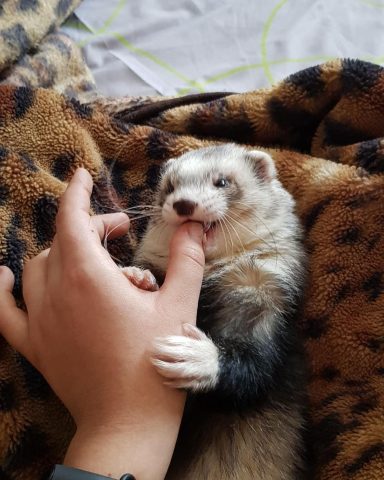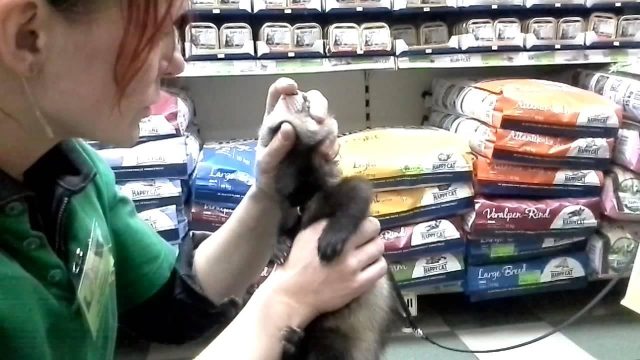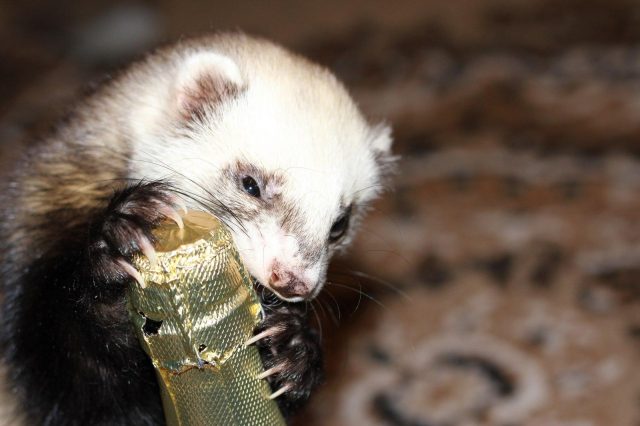Content
Training your ferret to bite can be difficult. Ferrets are playful and curious, often testing objects or biting to initiate play. Some animals begin biting in childhood and continue into adulthood. To wean the animal, it is necessary to determine why the ferret bites and what to do to stop this behavior.
Why does a ferret bite?
Raising an animal of the Mustelidae family is a process that requires patience and responsibility. It is necessary to understand the reason that prompts your pet to bite and act based on an analysis of the specific situation. Ferrets are intelligent and highly trainable.
Finding out the reasons for the animal's bad behavior will require the owner to change his own style of communication with the pet. Bites out of fear require a response with a gentle and gradual approach, excluding punishment in any form. Bites as an invitation to play are corrected by redirecting attention.A pet who has never bitten but suddenly becomes violent and aggressive may have health problems.
Behavior of ferrets when changing environment
Small predators explore their environment using their mouths, as they have rather poor eyesight. It is possible that one ferret bites for several reasons at the same time. The only control method chosen may not work in this case. Ferrets often bite to get attention, to calm down, out of fear, or to initiate play. They don't understand that their sharp little teeth give little pleasure to humans.
Bites out of fear
Ferrets that are not trained in their youth and are poorly socialized animals may bite out of fear. The same thing can happen to ferrets that have been mistreated. Some animals lack confidence and are generally more prone to snapping. Behavior often worsens when suppressed. When ferrets are punished by clicking the nose or shaking the scruff of the neck, it worsens the behavior, frightening the animal and causing them to bite even more.
They begin by accustoming the small predator to hands with the help of treats. The owner uses any food that the pet likes. For fussy ferrets, fish oil or beaten eggs held on your finger work great. The owner encourages calm behavior and gradually gains the pet's trust. Instead of trying to grab the animal, you just need to raise your hand to it and treat it with delicious food.
Such training should be short. Eventually, the owner will be able to touch the ferret and then gently pick it up.
Bites to start the game
The pet must understand that the owner's hands and feet are not toys, and if he bites, the play will be stopped.If the animal rushes at the owner to start the game, the person removes his hands and turns away or walks away. If the ferret is chasing the owner, you should not move or respond to the game. Rewarding with treats and attention follows calm play behavior. Once the biting starts again, the game stops. The owner should behave this way until his little friend understands that biting is bad.
Biting to communicate
The ferret bites both in order to attract attention, and also in order to be picked up. At first he may show that he wants attention in other ways:
- Follows the owner's heels.
- He waits and stubbornly does not take his eyes off the person.
- Sniffs the owner.
If the owner ignores the first request, the small predator will try to bite and thus attract the person's attention. Gradually, this behavior can become entrenched.
The pet ferret may also bite to tell its owners that it doesn't like something, so it's best to catch the animal's signals before it resorts to biting. It is recommended to keep play sessions short and frequent, and to avoid “hard play” by teaching your ferret to play in other ways.
Some animals don't like being cornered. Such a game provokes the pet to attack a person. It is necessary to analyze the behavior of the animal in order to identify certain situations in which it rushes into battle. And in the future avoid such games.
Deaf and blind ferrets
If a previously well-behaved ferret suddenly begins to bite, it is necessary to visit a veterinarian for a check-up. This behavior may be a sign of illness. The newly purchased animal may be deaf or blind.A resting blind or deaf pet, surprised or frightened, may accidentally bite its owner. The animal feels vulnerable, and its owner needs to develop a signal so that the ferret knows and senses the presence of a person.
Hormones in ferrets
Ferrets begin to bite more actively and more often:
- With hormonal changes during estrus in females.
- With hormonal changes in males during puberty.
- For diseases of the adrenal glands.
If everything was fine with the animal since childhood, and after growing up problems with bites began, a trip to the veterinarian is necessary.
An animal that is in pain may also begin to bite, which is the ferret's only way of communicating its discomfort.
Smells or noises
A ferret may bite when its owner smells a certain way. For example, communication with an animal occurs after cooking. And it is possible that the ferret does not like the smell, then he shows redirected aggression. It may also be that a person smells like treats for a ferret, and the animal cannot distinguish between food and owner.
Certain sounds can irritate your fur baby and you should try to avoid them. You can give a small predator a toy so that he can endure the bites as an expression of his state of being in love with her.
Behavior of ferrets when changing environment
Ferrets are irritable when exploring. Often their behavior unintentionally worsens when something new comes into their lives. When an animal has a new owner, a new family member, guests arrive, or a move to another apartment occurs, it may begin to bite. It takes time and patience to wean the animal from this behavior.A young specimen can be trained within a few weeks, but the older generation often takes months to rehabilitate.
Training methods at home
The owner can train the ferret with treats and gentle handling.
You can also calm your pet by lightly pressing it to a surface, for example, the floor: this is how adult ferrets raise their young.
You can use a spray bottle of water: this is a simple method for making the animal immediately release its hand.
If a ferret has bitten and cannot open its teeth, you need to rub its back and carefully place your finger in its mouth so that the animal will let go of its owner.
If your pet likes to fight, whenever he bites, it is better to redirect his attention to the toy and remove his hands. The ferret needs to learn the difference between hands and toys. It is advisable to use toys during vigorous activity. Using items in energetic play will help protect the owner from animal bites.
A few tricks to stop your ferret from biting
If an animal bites and becomes dangerous to humans, the easiest way to switch it is to put it in a cage for a few minutes. To carry the animal, take it by the scruff of the neck (folds of skin at the back of the neck). This is how a mother ferret moves her children. Both the animal and the owner’s hands will not be harmed. This method of restricting freedom when lifting by the withers is not recommended as a punishment.
The pet can take a “time out” anywhere. The main thing is that it should be a boring and isolated place, for example, a transport cage. Ideally, it is better that this is not a permanent cage, since the animal can transfer such a restriction to other situations. You can have a special cage with a drinking bowl and tray.In animals of the mustelid family, attention quickly dissipates, so the duration of punishment is from 3 to 5 minutes: this is the time when the animal will remember why it was isolated. When ferrets are released, they may bite their owner as revenge. It must immediately be returned back for a few more minutes.
Punishment by clicking the nose, splashing the ferret with water, hitting or throwing the animal will not teach the ferret appropriate alternative behavior and will make biting worse. Physical punishment tends to reinforce inappropriate behavior in the long term and shows the pet that aggression is appropriate.
Training video, which clearly shows the mental characteristics of predators.
At what age to start
Trokeys begin to be trained literally from infancy. It is better to immediately form the correct behavior than to wean an adult animal for a long time. The more flexible a ferret’s psyche is, the more pliable it is for the trainer. The baby will remember the commands faster and get used to the tray.
Training a ferret requires patience, time, and consistent technique. Punishment should be avoided by using rewards for calm behavior. It will take about 3 weeks (in some cases longer) for your ferret to learn to stop biting his owner.
What to do if an animal bites your legs
The most important thing in such a situation is not to harm the animal by involuntary jumping or swinging a leg. If your ferret has a tendency to bite his feet, you should wear thick socks or slippers. After each bite, the animal is carefully unhooked and placed in isolation for 3 to 5 minutes.
What to do if a ferret bites you until you bleed
If the bite is severe and causes bleeding, the ferret is placed in isolation, and then the wound should be taken care of.The ferret bite in the photo looks like punctures with an awl - deep and thin. It is necessary to remove the blood and disinfect the bite site. If the punctures are deep, you can apply a gauze swab and secure it with an adhesive plaster or bandage. Typically, punctures bleed quite heavily, which is good, since the risk of suppuration and inflammation is reduced. If this does happen, you should see a doctor.
It is important to remember that the ferret most often does not understand what he has done, and punishing him physically is pointless and cruel. Don't yell at your pet or hit him on the nose (this is painful and dangerous for ferrets). Taking an isolating break for a few minutes helps both the furry friend and its owner to calm down.
Conclusion
Any caring owner can stop a ferret from biting. The owner must pay close attention to his pet, notice signs of aggressive behavior and understand the reasons for the bites: whether it is fear or a need for attention, fear, discomfort, etc. It is necessary to quickly respond to the first signals indicating the needs of the animal. You should control the vivid expression of the reaction to the bite: just free yourself from the animal and switch it. The key is to encourage calm and caring communication.












